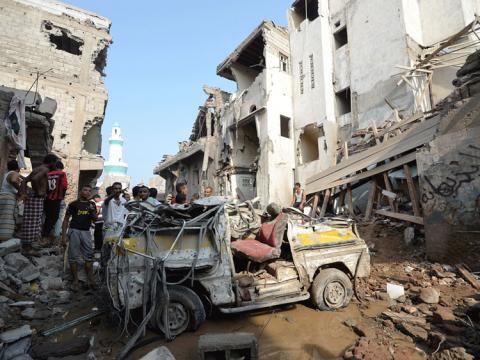Testimony: Taking the lead back in Yemen


Chairman Deutch, Ranking Member Wilson, and members of the subcommittee, thank you for your attention to securing America’s interests in Yemen and for the opportunity to participate in this hearing.
America has vital national security interests in Yemen. Al Qaeda in the Arabian Peninsula (AQAP), one of the terrorist groups most focused on attacking the US homeland, retains a safe haven and support among local populations there. A small Islamic State affiliate also persists and could emerge as a threat. The Iranian-backed al Houthi movement threatens the free flow of goods through one of the world’s most important maritime chokepoints, the Bab el Mandab Strait, and increases the risk of regional conflict by attacking population centers in Saudi Arabia and the United Arab Emirates. The deepening humanitarian catastrophe in Yemen fuels the conflict and threatens to spread waves of refugees through an already destabilized region. The US must refocus on Yemen to develop a policy that recognizes and addresses all of these interests. America must, above all, retake a leadership role in securing itself and shaping the actions of its allies so that they support our interests and accord with international law and norms.
American leadership in Yemen does not mean deploying massive military forces. It does mean ending the practice of outsourcing pursuit of our interests in Yemen to local partners who do not share our concerns or objectives and lack our capabilities to develop and execute sound plans.
The leadership most required in the first instance is strategic and political. The US must help our partners develop sound strategies that will lead to a resolution of the underlying conflicts that create space for both al Qaeda and Iran to operate in Yemen, rather than partial and limited approaches that are only exacerbating those conflicts. The US must also engage diplomatically not only with the formal Yemeni government it recognizes and the United Nations–led peace process, but also with substate actors throughout Yemen whose views will ultimately determine the durability of any negotiated settlement.
Experts and practitioners generally agree about the problems in Yemen as the country enters its fifth year of war. Few, if any, believe that the Arab coalition can deliver a political resolution to the conflict. Some believe, or hope, that Yemenis might be able to resolve the political conflict on their own or with international pressure. None can deny Iran’s support to the al Houthi movement and how it has changed, or that al Qaeda retains support zones and some popular support in parts of the country. Nearly all assess the overall engagement of the coalition at this point to be harmful rather than helpful in the long term. All agree on how dire the humanitarian situation in Yemen is and that it is worse than the official UN reporting. Consensus does not exist, however, on the best way forward except that the solution is not a military one. That consensus is correct—there is no purely military solution to the problems in Yemen. We must remember, however, that Yemen is a theater in which multiple wars are being fought, so neither can there be any solution that does not have a military component.
The United States bears some responsibility for the conditions in Yemen. The US subcontracted the protection of its interests to Gulf partners under the Obama administration while the US pursued the Iranian nuclear deal. The US has since allowed a fear of entanglement in Yemen’s civil war to dictate policy. The US supports Emirati counterterrorism efforts that have been tactically and operationally effective, but are unlikely to deliver a strategic defeat of al Qaeda and other Salafi-jihadi groups in Yemen. The US supports the coalition in its efforts to restore the internationally recognized Yemeni government to power against the Iranian-backed al Houthi movement but has not helped provide a strategic framework for the coalition and has not begun to help address the myriad grievances that led to the civil war in the first place. American efforts to stay out of the Yemeni mire have helped make the situation worse and reduced the likelihood that our vital national interests will be secured.
AFP.

Yemeni officials on Monday condemned arrests and prosecutions by the Iran-backed Houthi militia directed against media, journalists and celebrities…

Yemen's warring parties are gearing up for new waves of conflict in 2023 amid a lack of decisive steps towards sustainable peace, adding to the suf…

The UAE will help to recruit doctors and deliver crucial supplies for hospitals in Yemen under a major healthcare drive. The Khalifa bin…